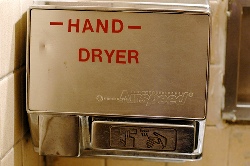A Sept. 15 New York Times article on Atlas Shrugged is moving up the “most e-mailed” charts.
Although the book was panned by critics when it was released, in 1957, Ayn Rand’s 1200-page paean to capitalism has earned a permanent place in the libraries of CEOs and other capitalistic types–and anyone else who embraces the book’s “greed is good” philosophy. According to the article, bookstores sold 150,000 copies last year.
I don’t use “greed is good” as a disparaging description of the novel. The phrase is actually an objective way to describe Rand’s philosophy, which is unselfconsciously called Objectivism. She believed that selfishness was a moral imperative.
The Times understands the allure of Atlas Shrugged for business execs:
Some business leaders might be unsettled by the idea that the only thing members of the leadership class have in common is their success. James M. Kilts, who led turnarounds at Gillette, Nabisco and Kraft, said he encountered “Atlas” at “a time in college life when everybody was a nihilist, anti-establishment, and a collectivist.” He found her writing reassuring because it made success seem rational. [Emphasis added]
After reading The Black Swan, by Nassim Taleb, I’m more inclined to believe that success is being able to capitalize on luck—being in the right place at the right time, having parents who value education and pay for tuition, etc.
CEOs would rather believe in their own brilliance, and Ayn Rand gave them a handy philosophy with which to do so. She didn’t believe in success by luck. In her world, those who weren’t successful were either lazy or incompetent or just plain evil. She believed in success by merit and hard work—a truly American (and simplistic) notion.
As it happens, Alan Greenspan, whose memoir is being released this week, was a huge Rand fan, and he wrote many articles for her newsletter, The Objectivist.
If you can get past the initial shock of how long Rand’s books are and actually start reading one, you’ll find that they are incredibly seductive. Her philosophy is half-baked, but her storytelling abilities are fully baked. And ultimately, that is probably why her ideas persist—they are wrapped in epic stories with heroic heroes and villainous villains. (In fact, Atlas Shrugged is so hyperbolic, I’m surprised it hasn’t been adapted into a comic book or graphic novel.)
 Here are the two biggest news stories to come from the recording industry in the past week:
Here are the two biggest news stories to come from the recording industry in the past week: